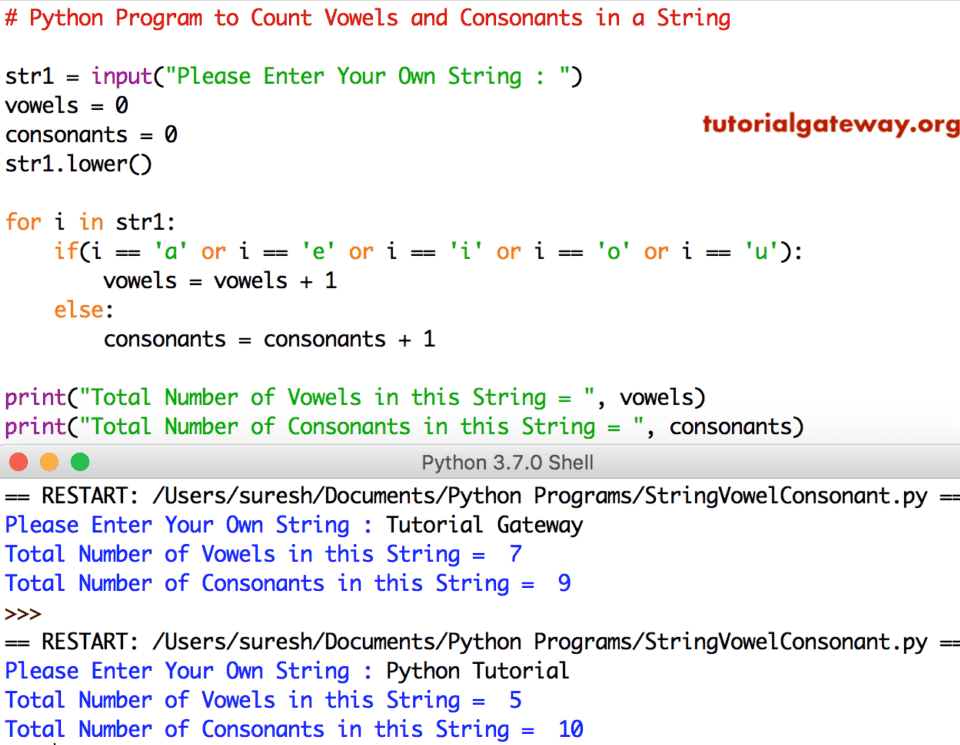编写一个 Python 程序,使用 For 循环和 ASCII 值,通过实际示例计算字符串中的元音字母和辅音字母。
Python 程序计算字符串中的元音字母和辅音字母示例
此 Python 程序允许用户输入一个字符串。接下来,它使用 For 循环计算此字符串中元音字母和辅音字母的总数。首先,我们使用 Python For 循环迭代字符串中的每个字符。在 For 循环内部,我们使用 If 语句来检查字符串字符是否为 a、e、i、o、u、A、E、I、O、U。如果为真,则增加元音字母的值,否则增加辅音字母的值。
# Python Program to Count Vowels and Consonants in a String
str1 = input("Please Enter Your Own String : ")
vowels = 0
consonants = 0
for i in str1:
if(i == 'a' or i == 'e' or i == 'i' or i == 'o' or i == 'u'
or i == 'A' or i == 'E' or i == 'I' or i == 'O' or i == 'U'):
vowels = vowels + 1
else:
consonants = consonants + 1
print("Total Number of Vowels in this String = ", vowels)
print("Total Number of Consonants in this String = ", consonants)
Python 计算字符串中的元音字母和辅音字母的输出
Please Enter Your Own String : Hello WOrld
Total Number of Vowels in this String = 3
Total Number of Consonants in this String = 8
>>>
Please Enter Your Own String : Python Programs
Total Number of Vowels in this String = 3
Total Number of Consonants in this String = 12字符串中的元音字母和辅音字母计数程序 示例 2
在此程序中,我们使用 lower 函数将字符串转换为小写。通过这种方式,您可以在 Python If 语句中仅使用 a、e、i、o、u(避免大写字母)。
# Python Program to Count Vowels and Consonants in a String
str1 = input("Please Enter Your Own String : ")
vowels = 0
consonants = 0
str1.lower()
for i in str1:
if(i == 'a' or i == 'e' or i == 'i' or i == 'o' or i == 'u'):
vowels = vowels + 1
else:
consonants = consonants + 1
print("Total Number of Vowels in this String = ", vowels)
print("Total Number of Consonants in this String = ", consonants)

Python 程序计算总元音字母和辅音字母 示例 3
此程序使用 ASCII 值来查找元音字母和辅音字母。我建议您参考 ASCII 表文章以了解 ASCII 值。
# Python Program to Count Vowels and Consonants in a String
str1 = input("Please Enter Your Own String : ")
vowels = 0
consonants = 0
str1.lower()
for i in str1:
if(ord(i) == 65 or ord(i) == 69 or ord(i) == 73
or ord(i) == 79 or ord(i) == 85
or ord(i) == 97 or ord(i) == 101 or ord(i) == 105
or ord(i) == 111 or ord(i) == 117):
vowels = vowels + 1
elif((ord(i) >= 97 and ord(i) <= 122) or (ord(i) >= 65 and ord(i) <= 90)):
consonants = consonants + 1
print("Total Number of Vowels in this String = ", vowels)
print("Total Number of Consonants in this String = ", consonants)
Python 计算字符串中的元音字母和辅音字母的输出
Please Enter Your Own String : Python Examples
Total Number of Vowels in this String = 4
Total Number of Consonants in this String = 10
>>>
Please Enter Your Own String : Learn Python Programming
Total Number of Vowels in this String = 6
Total Number of Consonants in this String = 16
>>>